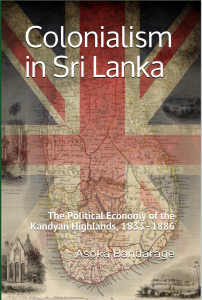
Colonialism in Sri Lanka: The Political Economy of the Kandyan Highlands, 1833-1886 (2nd Ed.) by Asoka Bandarage
Paperback – Vimukti Publishing, Sep. 14 2020. ISBN 978-1-7349414-0-1. Also available as ebook.
Vimukti Publishing is proud to present the second, expanded edition of a classic analysis of British colonialism in Sri Lanka, Colonialism in Sri Lanka; the Political Economy of the Kandyan Highlands, 1833–1886. Originally published by Mouton/De Gruyter in 1983, it focuses on the impact of the British plantation economy and colonial political authority on the Kandyan Highlands in the 19th century.
Unlike most studies of this subject, Dr. Bandarage examines the broader effects of colonialism on Ceylon and its context in the global political economy. This case study of a key period of British empire-building in Sri Lanka is also used to address the modern debate on development and underdevelopment.
This book was written to fill these gaps in the literature of Sri Lankan history and developmental theory and provides a theoretically informed interpretation of the British colonial impact on Kandyan Ceylon during the 19th century.
This second expanded edition includes a significant new chapter, Neocolonialism in Sri Lanka, 2020, assessing the beleaguered state of Sri Lankan sovereignty in the midst of 2020, under the powerful forces of U.S., Chinese and Indian expansion in the region.
Press info
Please click here to download a press one-sheet, and a high resolution cover image is available here. Contact vimuktipublishing@gmail.com for more information.
Reviews of the 1st edition
“… Bandarage has graphically, almost lyrically, portrayed the intense conflicts generated by the interaction between various sectors of the economy … Bandarage’s is a forceful argument, its great authority deriving from extensive research and documentation … Her critical acumen is demonstrated admirably in the last Chapter on ‘Theoretical Conclusions’ where she evaluates … theoretical approaches in the complex problem of the nature of colonialism’s relationship with pre-colonial societies… “
Prof. Harbans Mukhia, Jawaharlal Nehru University, New Delhi, Social Scientist vol.13, No.4, April 1985
“As books on Sri Lanka multiply, it is stimulating to encounter one concerned with wide perspectives … Asoka Bandarage traces, with insight and objectivity, the ways in which the precolonial, economic and social order was metamorphosed … This volume is a valuable contribution to our understanding of the economic processes that transformed Sri Lanka in the nineteenth century… “
Dr. Ananada Wickrematatne, University of Chicago, The Journal of Asian Studies, vol.XLIV, No.2, Feb.1985
“… Bandarage displays considerable theoretical ability … The conclusions reached in this exemplary study will interest anyone studying the evolution of Third World economies and societies.”
Paul Salstrom, Brandeis University, Society for the Study of Labour History Bulletin, No. 48, Spring 1984
“… Bandarage’s theoretically guided case study is an outstanding success, both in its selection of material and its systematic use of it … “
John P. Neelsen, Internationales Asien Forum, Koln, March 1985
“… Colonialism in Sri Lanka, is perhaps the first attempt to apply the articulation of modes of production approach to interpret the modern social history of Ceylon … it stands as a significant contribution to our understanding of the social transformation of colonial Ceylon in the nineteenth century.”
Jayadeva Uyangoda, University of Hawaii, South Asia Bulletin, vol. V, No.2, 1985
